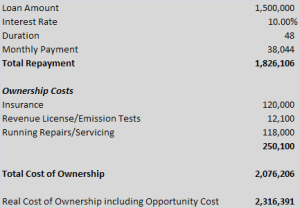“Wealth consists not in having great possessions, but in having few wants” – Epictetus
One of the richest people I know doesn’t own a car; nor does he use an office car. He instead prefers to travel by cab. This guy owns almost everything but a car; sitting on a diversified investment and asset portfolio which includes anything from land, apartments, stocks,bonds and deposits. (His story is a series of its own, which I will get around to writing, someday in the future)
On the other hand, one of the worst money managers I know ‘technically’ owns three cars. Over the last three years, this fellow has upgraded his car twice, losing more money with each upgrade. Two random people are paying leases which are currently under his name. (You should really avoid leasing if you are a salaried employee, but more on that in a separate article). So this guy is constantly stuck for cash because his lease rental is way above his pay grade. His disposable income and overall quality of life is under considerable stress simply because he wants to make a statement to the world.
I talk about my two friends because their viewpoints on wealth accumulation are very different. One believes that having an expensive car provides no utility and stands in the way of accumulating wealth while the other believes in a philosophy that “there is a big saving in a big car”.
Let me crunch the numbers.
Let’s start with the way to save the most money. The ideal miser would never own a car and travel by bus or would walk if he or she could. Let’s face it, that’s the best way to save the most amount of money. I’m going to use that as our base for cost calculations.
There are two things you can do, to get moving. You can buy a car or rent a car.
Renting a Car
I’m starting with the assumption that you can afford only 40,000 as rent over the 4 year period. So as inflation goes up, you change vehicles to fit your budget, keeping the cost at the same level. The amount you could have saved in 48 months by saving your monthly 40,000 in an account which pays you 5.5% interest is 2.142 million.
Buying a Car
There are two ways you can buy a car. With money you’ve saved up or through a Loan. Let’s start with the loan option.
Buying a Car on Loan
I’ve looked at a loan amount of 1.5 million over 4 years and also added associated ownership costs like servicing and insurance.
The 2.316 million is the theoretical amount you could’ve saved by not buying this car. I have added the savings account scenario which pays 5.5% from above to calculate the opportunity cost. You’d notice this cost is higher than the rental option because you are also spending 5000+ extra every month on things such as insurance and servicing.
Buying the Car on Cash
What if you have the money saved upfront and want to buy the car from the dealer. Apart from the ownership cost your real cost is the interest your money could’ve made sitting in a bank account.
In this case your investment would have made 2.040 million after 4 years and the money you didn’t spend on maintenance could also have been saved in an account which pays 5.5% over 4 years for a grand saving of 2.319 million.
In Summary let’s look at the option that brings you the most financial benefit. Assume that the vehicle can be sold after 4 years under the following assumptions.
Someone might suggest that a vehicle is an investment and in Sri Lanka it rarely, if ever, depreciates. While it may have been true in the good old age of Corolla AE 110’s and 121’s, the current vehicle landscape is arguably different.
Let’s look at the results
If you had any misconceptions before, you’d now note that vehicle ownership is not really an investment avenue. Go for the option you can afford and don’t be one of those people who stretch their budget to make lease payments with the misguided notion that they’re saving something for later. Also note that if your vehicle is worth more at the beginning, you’d lose more wealth in absolute terms in the future.
I guess you also noticed that it might not really be all that wise to put down all your savings on a car if you have a steady income to repay a loan over a given period. This is a phenomenon I like to call the ‘usefulness of debt’.
I’ll follow up more on that later.
PS-
I’ve added a calculation to illustrate why the rich guy uses the cab. The details are self explanatory.





Thought you’d add in the cost of using cabs like your friend does. Where does that sit in this scheme of things…
LikeLike
Good point bro! a timely analysis that a lot of our generation needs to see!
LikeLike